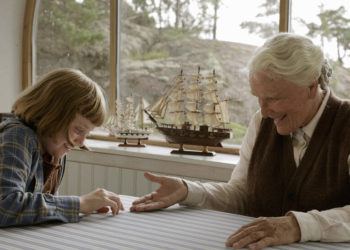PHILADELPHIA (AP) — Anthony Roth Costanzo, the man who hopes to keep surprising audiences during the company’s new season.
“It is very much opera. It’s dramatic, it’s cathartic, it’s collaborative in interdisciplinary ways,” Costanzo said of Opera Philadelphia’s 50th anniversary season — the first he’s been able to plan since taking charge of the financially teetering company last year. “But it’s different from what your perception of opera might be.”
He slated a work by Rossini to kick things off, with opening night set for Friday. But instead of choosing a repertory staple, Costanzo picked the less-familiar “Il viaggio a Reims.” And the production will be anything but traditional: Director Damiano Michieletto has changed the original setting from an inn to an art gallery where the portraits come alive and sing.
After that the offerings become even more adventurous. There’s a multimedia piece by playwright Sarah Ruhl set to music by Vivaldi — including “The Seasons” — and starring Costanzo, who maintains a flourishing performing career as a countertenor. Then comes a world premiere with libretto by Pulitzer-winner Michael R. Jackson and a score by 10 different composers. Another new opera follows, by Gregory Spears, in which the chorus has the starring role. Finally, bass-baritone Davóne Tines performs a “vaudevillian rendering” of a poem by Langston Hughes.
“As I put all of the pieces together, I thought, how can I encapsulate this in just a few simple words,” Costanzo said. “And what occurred to me was: ‘Opera, but different.’ And that is the slogan of the season.”
An offer too good to refuse
His pride in the lineup is understandable, especially given that when he took over it wasn’t certain there would even be a 2025-26 season.
The company was nearing bankruptcy and needed to quickly raise $4 million, he recalled.
Almost immediately he instituted a “pick your price” policy under which people could buy tickets to any seat in the house starting at $11. (The website gives buyers a range of higher options and invites them to make a donation on top of the purchase. Season subscriptions at higher prices are also still available.)
“I said OK, I have to think like a venture capitalist,” Costanzo said. “We’re going to have to spend money to make money. Besides, he said, the old pricing system was projected to bring in only 8% of the revenue the company needed, so little was at risk from the new policy.
A full house is hard to beat
The publicity and good will generated by the move helped the company quickly raise $7 million in donations, more than enough to retire the debt. When tickets went on sale for 2024-25, all three operas sold out within three weeks, and the season ended with a surplus of $2.4 million.
Corrado Rovaris, the company’s longtime music director, was on the podium for the season-opening performance last fall of a recent work having its U.S. premiere.
“It was amazing to see the reaction in the house,” he recalled. “Beautiful to see a full house but also to see such an enthusiastic house. Beautiful and very moving.”
Helen Little of New York City is one opera lover who was inspired by Costanzo’s pricing initiative to help the company financially.
“It’s a brilliant idea,” she said. “Because the tickets only cover a fraction of the cost of an opera. But the whole point is to spread good will, bring in new people, bring in young people, people who have never been to an opera. And good will is priceless.”
In a good portent for the growth of the company’s audience, two-thirds of those who chose the “pick your price option” had never bought tickets to Opera Philadelphia before, and most were under 45 years old. This year a similar percentage are either first-timers or repeats from last season.
As a result of the brighter financial outlook, the new season offers twice as many performances as last, though the budget is still substantially lower than it was in 2017, when the company launched an adventurous festival format that had several different works in performance over a period of two weeks.
Finding the magic number
Just how did Costanzo settle on that $11 figure?
“At first I thought it should be $25,” he said. “But the problem is that everywhere across the country I see ‘tickets starting at $25…’ and I thought people would see that and think, Oh, yeah, you can sit up in the top balcony.
“So I wanted to really distinguish it, and I thought a round number was less sticky … you don’t remember $15 or $10.”
Marc Scorca, president and CEO of Opera America, said he’s watching the company’s initiatives with great interest, but he cautions that it’s too soon to predict long-term victory.
“I appreciate that they’ve jumped into this with both feet,” he said. “Sometimes you need to have your back against the wall to take a bold experiment.
“I think the learning from it will be important not only to the company but to the field,” he said.
“And that will probably not play out for another couple of years until we see how much of that audience becomes a bona fide public for the company or just took advantage of an opportunity to experiment with something at a low price.”
The post Anthony Roth Costanzo, who introduced $11 tickets, brings opera with a difference to Philadelphia appeared first on Associated Press.




